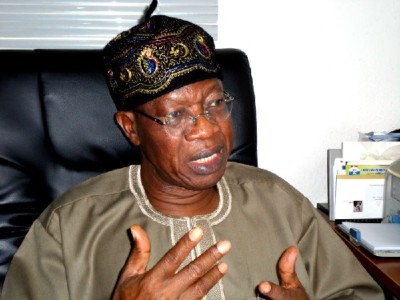
In 1996 when the first phase of the Liberian civil war was ending, one of the warlords, Brigadier General Yormie Johnson (who personally killed former dictator, the late President Samuel Doe) wrote a pamphlet where he recorded his random musings about the war and his philosophical attitudes to some issues connected thereto. He titled the book: The Gun That Liberates Should Not Rule. Lai Mohammed His argument is that a liberator’s role is to remove the problem and then, give way to those who have the capacity to correct it. If the gun that liberates mounts the throne, it will turn the liberator into a dictator. While most of the warlords who drove away Doe from power (such as Charles Taylor) jostled for leadership, Johnson simply came to Lagos to cool his heels, perhaps, his own way of walking his talk.
His postulations were later proved right, because Charles Taylor went on to become an even deadlier dictator than Doe and today answers for his crimes at the Hague. However, there are those who would fiercely disagree with Johnson’s argument. They would ask: what is the point of putting your hide on the line to drive away the perceived source of a nation’s problems if you cannot pick the courage to show you can do better? The tendency of most people who participate in getting rid of an entrenched ruling class is to entertain the feeling of legitmate entitlement to be part of the government that replaces it. Let’s face it: the 2015 presidential election was historic.
The removal of a ruling party from power through the polls rather than through the gun barrel was hitherto seen as an impossibility in our political cosmos. But it happened. Alhaji Lai Mohammed was the voice of the then opposition All Progressives Congress (APC), which performed the feat of dethroning the then ruling Peoples Democratic Party (PDP). You and I know that during elections, the truth is usually forced on a compulsory leave by all contestants. What remain are cleverly dressed-up falshood, hyperboles, false promises, false statistics, angelic characterisation of mere mortals and their dressing up in borrowed robes, diversion of attention from things that matter and the playing up of inanities to fool the gullible voter; in short, PROPAGANDA and its sly accoutrements.
There are people who are naturally gifted in the art of propaganda and are experts at it. Lai Mohammed, as the Publicity Secretary of the APC (the then opposition party) demonstrated his talents in the art of propaganda, matched only by Femi Fani-Kayode, who was belatedly drafted as the Director Publicity of the PDP presidential campaign to counter him. Lai knows his worth in this art, and boastfully beckons on his counterpart of the PDP, Chief Olisa Metuh, to come and receive lessons from him. Metuh, who was apparently too busy otherwise during the heady campaign period when Lai ruled the roost, was only to find his tongue after his party had been chucked out of power. President Muhammadu Buhari obviously does not believe in Johnson’s advisory. He believes that those who worked for the victory should be “rewarded”. I have absolutely nothing against this. Why else are people in politics if not to share in the spoils of power after victory? I am firmly of the view, however, that Buhari should not have appointed Lai Mohammed as Information and National Orientation Minister. He should not have been a spokesman for this government in any capacity whatsoever. He was effectively stigmatised as a propaganda warlord for an APC on campaign hustings. Some even went to portray “Lai” as “Lie” or in our local patois, “Lie-lie”. That is a bit unkind, because there was nothing that Lai Mohammed did during the campaigns that others have not done before or attempted to do but failed because of their lack of savvy. He did not commit any malfeasance that is not tolerated in an electioneering atmosphere.
But for a government that portrayed itself as coming to change the way things were done under the PDP and former President Goodluck Jonathan dispensation; for a new regime whose leader, Buhari was imbued in the colours of “integrity” and fortrightness, we needed an Information and National Orientation Minister unsullied by credibility and credulity issues. We needed someone we can trust to tell us the truth and we will believe him/her without a past track record standing between him and us. Unfortunately, Lai Mohammed came into his job believing that his appointment was a carte-blanche for him to transfer his propaganda exploits from electioneering to governance. He has justified our fears when his name was announced for Info. The Info Minister did this nation a great disservice when he called what he termed a “world press conference” on January 18th 2016 and sensationally “disclosed” that 55 Nigerians stole over N1.34 trillion in eight years. He never mentioned anybody’s name, never substantiated any of his claims. How many have been arrested for arraignment? When? He never told us.
He merely made worthless disclosures for their sensational impact as if he was still electioneering. Lai told us that Boko Haram had been “technically defeated” and “degraded” such that they could no longer stage attacks on communities. Since December 2015 when he made this claim, Boko Haram has sacked more than ten communities and killed hundreds. Lai told us that Jonathan bought sub-standard military equipment which killed more soldiers than the enemies. Director of Defence Information, the highest spokesman for the military, Brigadier-General Rabe Abubakar, went on television to debunk Lai’s claim, saying no such thing happened. This is unprecedented! Buhari had a rich trove of options to choose his Info Minister from. If he wanted someone from Bola Tinubu’s camp, there is Hon. Abike Dabiri; a great communicator whose credibility and credulity remain intact even after years of involvement at various levels of partisan politics and governance. Abike, for me, was the “man” for the job given to Lai.
VANGUARD
END

Be the first to comment